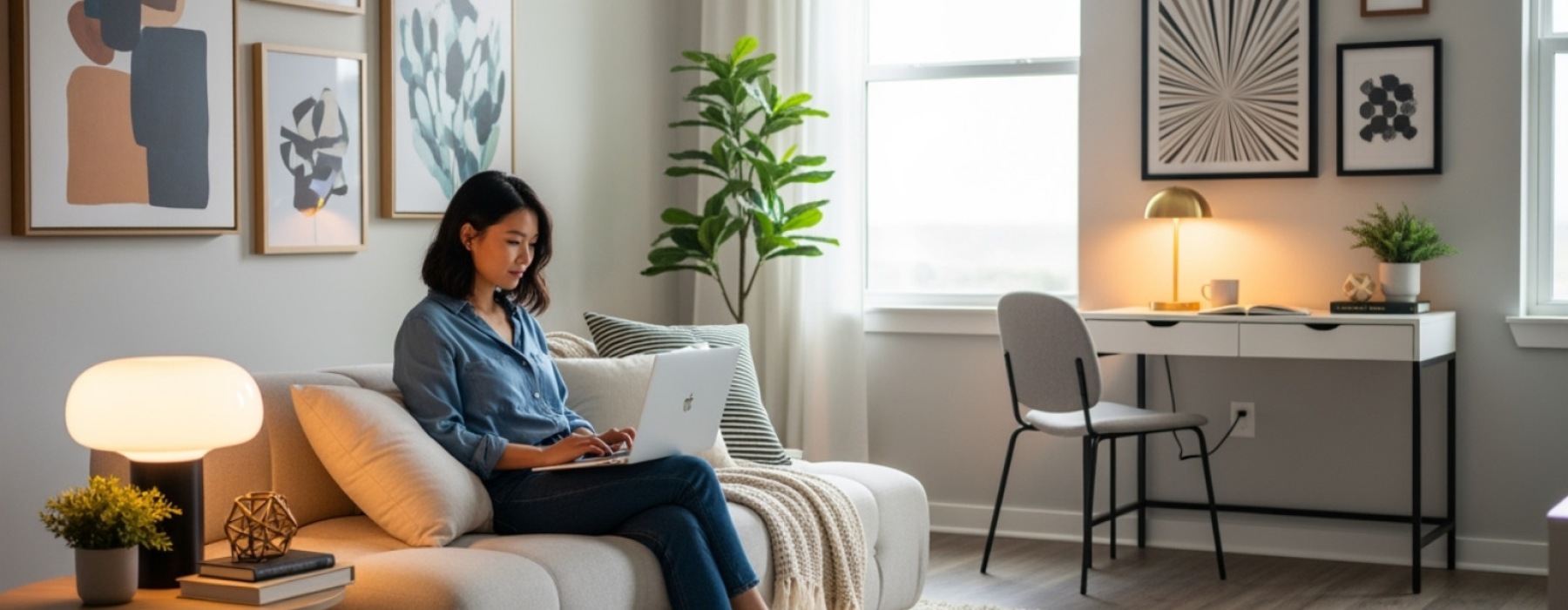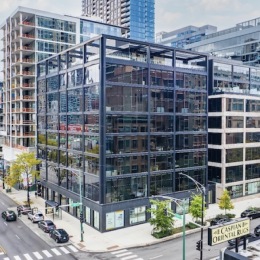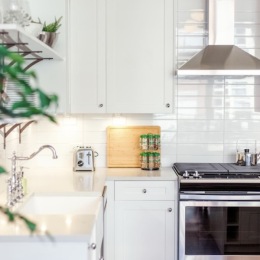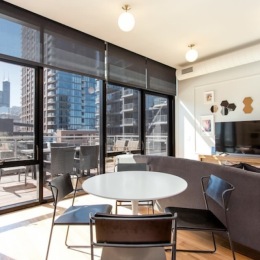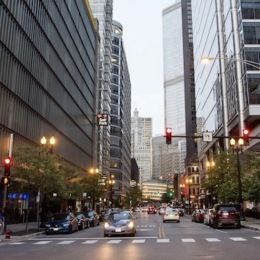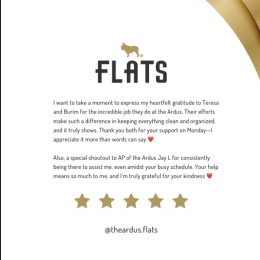Remote Control Your Life with Apartments Built for Digital Nomads
Why Digital Nomads Need Purpose-Built Homes
Apartments for remote workers are purpose-built living spaces that combine high-speed internet, dedicated workspaces, and flexible lease terms to support location-independent professionals. These specialized rentals typically offer gigabit Wi-Fi, ergonomic office setups, and minimum 30-day stays.
Key features remote workers need:
- Private high-speed internet (1 Gbps or higher)
- Dedicated workspace with standing desk and monitor
- Soundproofing for video calls
- Flexible lease terms (30 days to 11 months)
- Move-in ready furnishing with office equipment
- Building amenities like coworking lounges and fitness centers
The shift to remote work has created a new category of housing. Over 100 verified reviews highlight how these apartments solve the biggest pain points for digital nomads: unreliable internet and makeshift workspaces.
As one remote professional shared: "I'm a remote worker. I'm not on vacation. It makes all the difference that these trusted partners really understand that and know how to support me."
Traditional hotels and short-term rentals weren't designed for productivity. Remote-focused apartments bridge this gap by treating your living space as both home and office. They're equipped with everything from green screens to dual monitors, letting you plug in and start working immediately.
The minimum 30-day rental period caters to the "slow travel" lifestyle many remote workers prefer. This gives you time to establish routines, explore neighborhoods, and avoid the constant packing and unpacking of shorter stays.
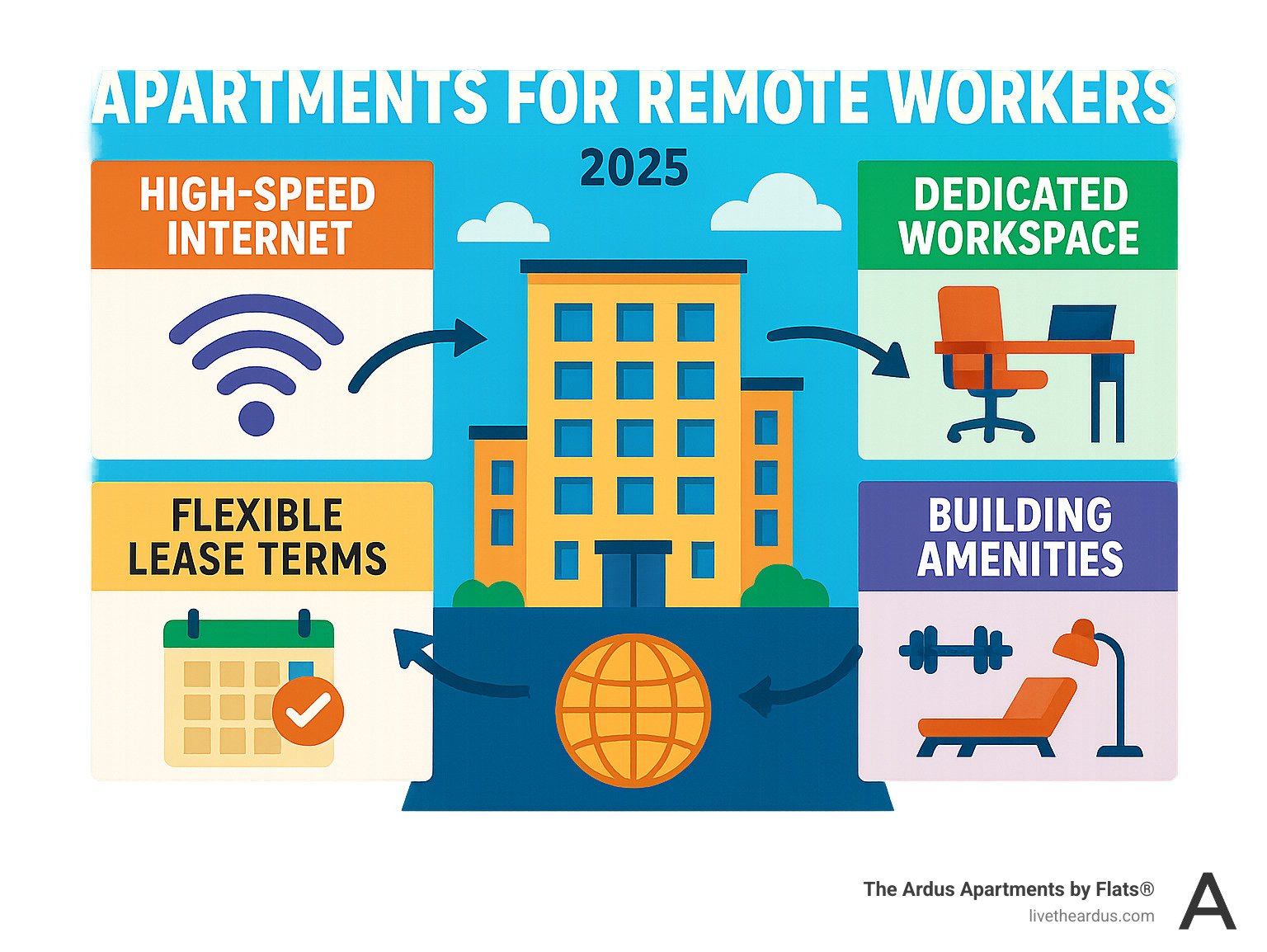
Why Digital Nomads Need Purpose-Built Homes
The rise of remote work has fundamentally changed what we need from our living spaces. A typical vacation rental might have charming decor and a great location, but it rarely includes the professional infrastructure required for productive work. Digital nomads need homes that function as both sanctuary and office.
Apartments for remote workers address this by integrating professional-grade equipment into residential spaces. We're talking about private gigabit internet, standing desks, ultra-wide monitors, and even broadcast-quality lighting for video calls. These aren't afterthoughts - they're core features designed from the ground up.
The wellness component is equally important. Many remote-focused buildings include fitness centers, yoga studios, and rooftop terraces with Wi-Fi. These spaces help combat the isolation that can come with location-independent work. At The Ardus Apartments, our rooftop lounge provides the perfect backdrop for informal meetings or a change of scenery during long work sessions.
Community events are another crucial element. Whether it's skill-sharing nights or networking meetups, these apartments foster connections between like-minded professionals. The slow travel lifestyle means you're not just passing through - you're temporarily joining a community.
Flexible leases accommodate the reality of remote work contracts and visa requirements. Traditional apartments often require year-long commitments, while vacation rentals max out at a few weeks. The sweet spot for most remote workers is 1-11 months, allowing for deep immersion without permanent relocation.
The Remote-Work Revolution
The numbers tell the story: remote work has shifted from a perk to a standard practice. Hybrid jobs now dominate many industries, with employees splitting time between home offices and traditional workplaces. This flexibility has created a new category of worker - those who can truly work from anywhere.
Location independence means different things to different people. Some chase summer around the globe, others prefer to experience different cultures for months at a time. The key is having housing that supports professional productivity regardless of where you land.
Mid-term stays have emerged as the perfect solution. They're long enough to establish routines and build local connections, but short enough to maintain flexibility. The minimum 30-day rental period allows remote workers to truly settle in, rather than living out of a suitcase.
Benefits of Renting 30+ Days
The 30-day minimum isn't arbitrary - it's based on the practical realities of remote work and travel. Many tourist visas allow stays of 30-90 days without complex paperwork, making this timeframe ideal for international nomads.
Deeper immersion becomes possible when you're not constantly planning your next move. You can join local coworking spaces, attend regular networking events, and even take language classes. This transforms travel from a series of short visits into meaningful cultural experiences.
Platform protection provides peace of mind that traditional rentals often lack. Reputable platforms verify both properties and guests, handle deposits securely, and provide customer support throughout your stay. This professional infrastructure makes remote work travel much less stressful.
Apartments for Remote Workers: Essential Features Checklist
Not all apartments are created equal when it comes to remote work. Here's what to look for when evaluating potential homes:
High-speed internet is non-negotiable. Look for properties advertising 1 Gbps or higher, with private networks rather than shared building Wi-Fi. Some premium locations offer redundant connections from multiple providers to ensure you're never offline.
Dedicated office space means more than just a desk in the corner. The best remote-friendly apartments include standing desks, ergonomic chairs, and proper lighting. Some even provide ultra-wide monitors, webcams, and professional audio equipment.
Soundproofing becomes critical when you're taking calls throughout the day. Look for apartments with solid walls between units and away from high-traffic areas. Some buildings specifically market "quiet zones" for remote workers.
Natural light affects both mood and video call quality. Apartments with large windows and good orientation can dramatically improve your work environment. Floor-to-ceiling windows are increasingly common in premium remote-friendly buildings.
In-unit laundry might seem basic, but it's essential for longer stays. Having your own washer and dryer means you can pack lighter and maintain professional attire without constant trips to laundromats.
Smart home technology can improve both comfort and productivity. Look for units with app-controlled climate, lighting, and security systems. Some even include smart speakers and displays for easy calendar management.
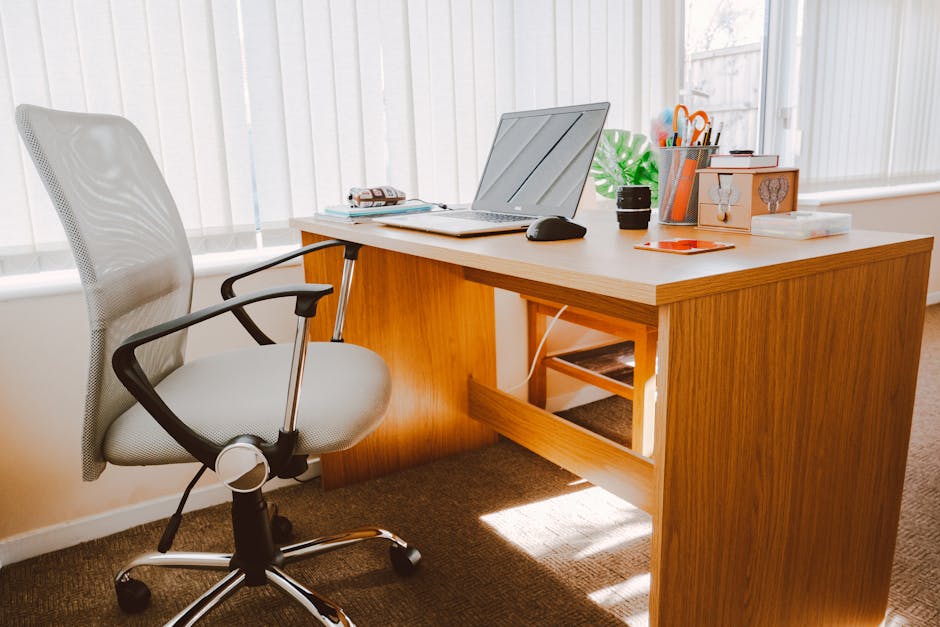
Dedicated Workspaces in Apartments for Remote Workers
The workspace is where apartments for remote workers truly shine. These aren't just furnished apartments with a desk thrown in - they're carefully designed work environments that rival traditional offices.
Standing desks have become standard in premium remote-friendly units. These adjustable workstations promote better posture and energy levels during long work sessions. Many include memory settings so you can quickly switch between sitting and standing heights.
Ultra-wide monitors are increasingly common, with some apartments providing 34-inch curved displays. These eliminate the need for multiple monitors while providing ample screen real estate for complex projects. The monitors often come with USB-C connectivity, making it easy to connect laptops with a single cable.
Professional audio-visual equipment sets these apartments apart from standard rentals. This includes high-quality webcams, noise-cancelling microphones, and even green screens for virtual backgrounds. Some units provide broadcast-quality lighting with adjustable color temperature.
High-Speed Private Internet in Apartments for Remote Workers
Internet connectivity can make or break a remote work experience. Apartments for remote workers prioritize this above almost everything else, often providing enterprise-grade connections that exceed what many traditional offices offer.
Fiber lines are the gold standard, with many apartments advertising symmetrical gigabit connections. This means 1 Gbps both upload and download, crucial for video calls, file sharing, and cloud-based work. Some premium locations even offer multi-gigabit connections.
VPN compatibility is essential for workers who need to access company networks securely. The best apartments test their connections with common VPN protocols to ensure smooth performance. Some even provide dedicated VPN servers for additional security.
How to Pick the Perfect Location for Remote Work
Location selection goes far beyond just finding a nice place to visit. Remote workers need to consider factors that affect both productivity and quality of life. The decision between city and countryside, for example, involves trade-offs between amenities and tranquility.
City locations offer proximity to coworking spaces, networking events, and cultural attractions. Urban areas typically have better internet infrastructure and more dining options. However, they can be noisier and more expensive. Cities like Chicago offer the perfect blend - urban amenities with manageable noise levels, especially in well-designed buildings like The Ardus Apartments.
Countryside locations provide peace and often lower costs, but may lack reliable internet or professional services. Rural areas can be perfect for deep work but challenging for collaboration that requires video calls or file sharing.
Walkability affects daily quality of life significantly. Being able to walk to grocery stores, cafes, and fitness facilities reduces stress and transportation costs. Many remote workers specifically seek neighborhoods with high walk scores.
Time-zone alignment becomes crucial when working with distributed teams. Being too far from your colleagues' time zones can lead to isolation and scheduling challenges. Consider how your work schedule will align with both your team and local business hours.
Climate considerations affect both comfort and productivity. Some remote workers chase perpetual spring, while others prefer seasonal variety. Consider factors like humidity, air quality, and natural light when evaluating locations.
Cultural scene and language barriers can significantly impact your experience. Areas with strong expat communities often provide easier transitions, while immersive local experiences might require more adaptation but offer richer cultural learning.
Global Hotspots & Digital Nomad Visas
Certain countries have emerged as remote work magnets, offering combinations of infrastructure, culture, and visa-friendly policies. Portugal leads the pack with its D7 visa program, allowing remote workers to establish temporary residency. The country offers excellent internet infrastructure and a growing community of digital nomads.
Spain's non-lucrative visa provides another European option, particularly attractive for its climate and cultural offerings. Cities like Barcelona and Madrid feature prominently in remote worker apartment listings, with thousands of verified options available.
Germany's freelancer visa opens doors to one of Europe's strongest economies. Berlin, in particular, has become a hub for tech workers and creative professionals. The city offers excellent public transportation and a vibrant startup scene.
Australia's Working Holiday visa program, while traditionally aimed at younger travelers, has evolved to accommodate remote workers. The country's strong internet infrastructure and English-speaking environment make it attractive for North American remote workers.
Mexico's proximity to the United States and favorable exchange rates have made it increasingly popular. Cities like Mexico City offer modern amenities at relatively low costs, though visa requirements can be complex for longer stays.
Croatia's digital nomad visa program specifically targets remote workers, offering one-year permits for qualifying professionals. The country's EU membership and stunning coastline make it particularly attractive for European remote workers.
Neighborhood Checklist
Beyond the apartment itself, the surrounding neighborhood significantly impacts your remote work experience. Grocery access within walking distance reduces daily friction and helps maintain healthy eating habits during busy work periods.
Transit links become important even for remote workers. Access to airports for occasional travel, and public transportation for exploring the city, adds convenience and reduces costs. Many remote workers prefer neighborhoods with direct airport connections.
Safety ratings provide peace of mind, especially for solo travelers. Research local crime statistics and read recent reviews from other remote workers. Well-lit streets and active street life often indicate safer neighborhoods.
Green spaces contribute to mental health and work-life balance. Parks, waterfront areas, and walking paths provide essential breaks from screen time. Many remote workers specifically seek neighborhoods with easy access to nature.
Quality Assurance & Trusted Booking Platforms
The remote work apartment industry has matured significantly, with platforms implementing rigorous quality controls to protect both property owners and renters. These systems help ensure that what you see online matches what you'll find upon arrival.
ID verification has become standard practice, with most platforms requiring government-issued identification from both renters and property owners. This creates accountability and helps prevent fraud. Some platforms also require video verification calls before confirming bookings.
Landlord screening processes evaluate property owners based on response times, property conditions, and guest reviews. Platforms often conduct in-person property inspections and require professional photography. This helps maintain consistent quality standards across listings.
Deposit safeguards protect renters from unfair charges while giving property owners security. Many platforms hold deposits in escrow, releasing funds only after both parties agree on any deductions. This system provides transparency and dispute resolution.
Guest reviews focus on elements crucial to remote work success: internet reliability, workspace quality, and noise levels. These reviews are often verified through booking confirmations, ensuring authenticity. The most helpful reviews come from other remote workers who understand the specific challenges.
Latest research on remote insurance
How Mid-Term Platforms Vet Listings
Quality control starts with professional photography requirements. Platforms typically require high-resolution images of all living spaces, with particular attention to workspace areas. Some require specific shots of internet speed tests and office equipment.
Speed tests are increasingly common, with platforms requiring proof of internet performance before approving listings. This might include screenshots of speed test results or even live video demonstrations of connectivity during peak usage hours.
Workspace audits evaluate the ergonomics and functionality of office areas. This includes desk height, chair quality, lighting conditions, and noise levels. Some platforms maintain checklists of required equipment, from monitors to webcams.
Customer Support Expectations
Twenty-four-seven chat support has become table stakes for premium remote work platforms. When your livelihood depends on internet connectivity and workspace functionality, immediate support access is crucial. The best platforms offer multiple contact methods including phone, chat, and email.
Maintenance coordination becomes particularly important for longer stays. Platforms often serve as intermediaries between guests and property owners, ensuring prompt resolution of issues. This might include coordinating internet service calls or replacing office equipment.
Flexible extensions accommodate the unpredictable nature of remote work contracts. Good platforms make it easy to extend stays when projects run long or visa situations change. This flexibility often involves negotiating directly with property owners on behalf of guests.
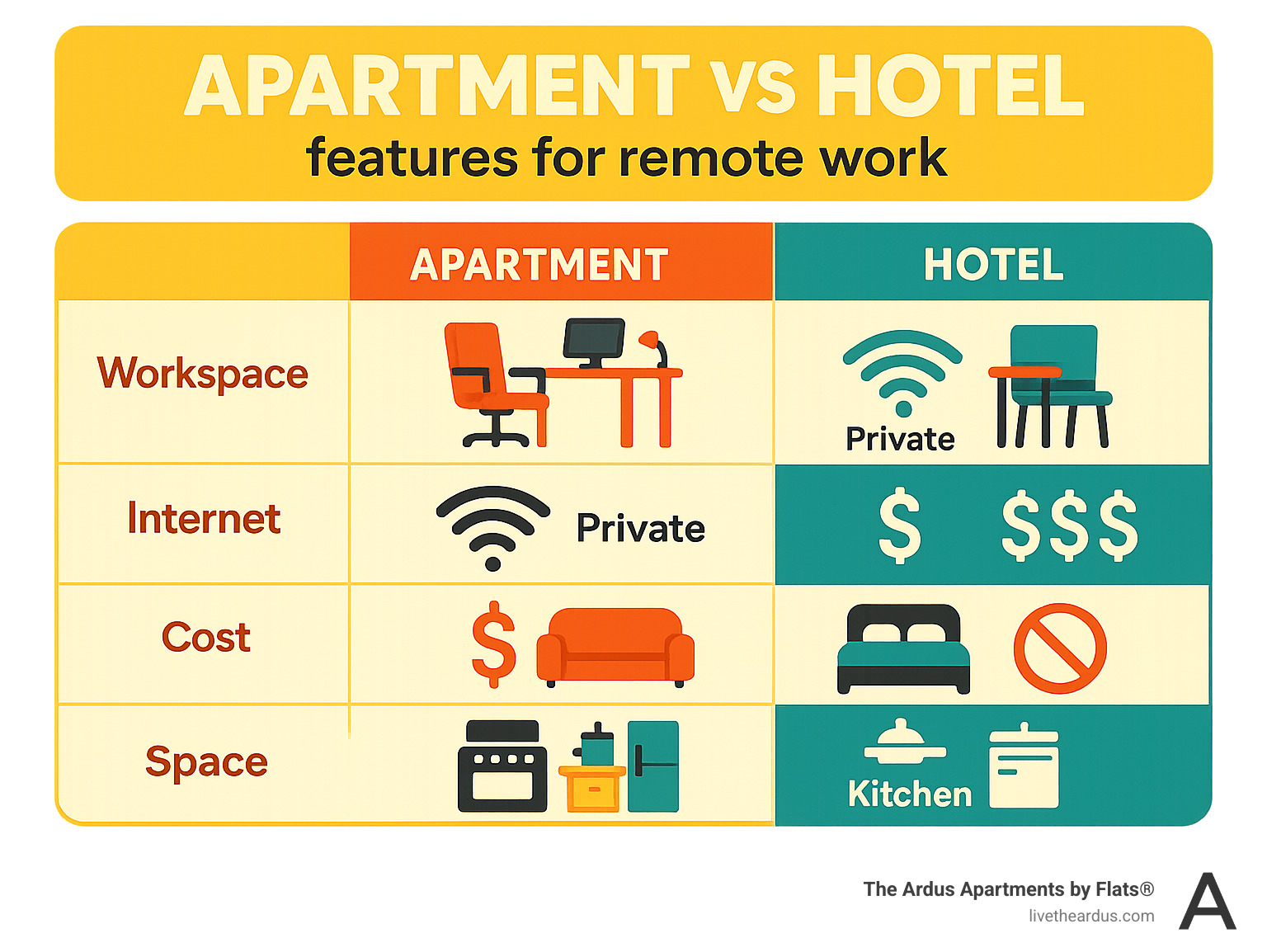
Coliving vs. Private Rentals: Which Fits Your Workflow?
The choice between coliving spaces and private apartments for remote workers depends largely on your work style and social preferences. Both options have evolved to serve remote workers specifically, but they cater to different needs and personalities.
Coliving spaces excel at community building and networking. These environments naturally foster connections between residents, often leading to professional collaborations and lasting friendships. Many coliving spaces organize regular events like skill-sharing sessions, mastermind groups, and social mixers.
Privacy levels vary significantly between the two options. Coliving typically involves shared common areas and sometimes shared bedrooms, while private apartments offer complete control over your environment. This becomes particularly important for remote workers who handle confidential information or need quiet spaces for important calls.
Shared amenities in coliving spaces often include professional-grade coworking areas, high-end kitchen facilities, and recreational spaces. These shared resources can be more extensive than what you'd find in a private apartment, but you're also sharing them with other residents.
Event programming in coliving spaces can provide valuable professional development opportunities. Many spaces host workshops, speaker series, and networking events specifically designed for remote workers. This built-in community can be especially valuable for solo travelers.
Monthly cost inclusions differ between the two models. Coliving spaces typically bundle utilities, internet, and cleaning services into a single monthly fee, while private apartments may charge these separately. The all-inclusive model can simplify budgeting but may cost more overall.
Coliving Benefits for Networking
Skill-share nights are common in coliving spaces, where residents teach each other professional skills. These informal sessions can range from coding workshops to marketing strategy discussions. The diversity of professional backgrounds in coliving spaces makes these exchanges particularly valuable.
Mastermind groups form naturally when ambitious professionals live in close proximity. These small groups meet regularly to discuss challenges, share resources, and hold each other accountable. The structured peer support can be incredibly valuable for freelancers and entrepreneurs.
Built-in coworking spaces eliminate the need to find external workspace. These areas are designed specifically for the residents' needs, often featuring better equipment and more reliable internet than public coworking spaces. The convenience of walking from your bedroom to a professional workspace cannot be overstated.
Professional connections often extend beyond the coliving space itself. Residents frequently introduce each other to their professional networks, creating opportunities that wouldn't exist in traditional housing arrangements. These connections can lead to collaborations, job opportunities, and long-term business relationships.
When a Private Apartment Wins
Confidential calls require complete privacy that coliving spaces cannot guarantee. When handling sensitive client information or participating in high-stakes meetings, having your own space becomes essential. Private apartments eliminate concerns about being overheard or interrupted.
Custom office gear becomes possible when you have complete control over your workspace. This might include multiple monitors, specialized software, or industry-specific equipment. Private apartments allow you to optimize your workspace exactly for your needs without considering other residents.
Family or partner stays are much easier in private apartments. Coliving spaces often have restrictions on guests, while private apartments typically allow you to host family members or travel companions. This flexibility becomes important for remote workers who want to combine work travel with personal relationships.
Routine control is another advantage of private apartments. You can set your own schedule for meals, work, and relaxation without coordinating with housemates. This autonomy can be crucial for remote workers in different time zones or with unusual work schedules.
Frequently Asked Questions about Remote-Friendly Apartments
What legal or visa steps should I check before signing a lease?
Visa requirements vary significantly by country and can affect your ability to rent apartments legally. Tourist visas typically allow stays of 30-90 days, which aligns well with the minimum rental periods of most remote-friendly apartments. However, some countries require proof of accommodation for visa applications, so you may need to book before traveling.
Tax implications can be complex for remote workers spending significant time in different countries. Many countries have tax residency rules based on days present, so stays longer than 90 days might trigger tax obligations. Consult with a tax professional familiar with international remote work before committing to extended stays.
Rental registration requirements exist in many cities, requiring temporary residents to register with local authorities. This process is usually straightforward but may require specific documentation. Some apartment platforms assist with this process, while others expect you to handle it independently.
Work permit considerations apply even to remote workers in some countries. While you're not seeking local employment, some countries restrict any form of work activity. Research local regulations and consider consulting with immigration professionals for stays longer than tourist visa limits.
What is usually included in the rent for an apartment geared toward remote work?
High-speed internet is typically included in the base rent, often with speeds of 1 Gbps or higher. This usually includes private network access rather than shared building Wi-Fi. Some premium apartments even include backup internet connections from multiple providers.
Workspace equipment varies by property but often includes ergonomic desks and chairs, monitors, and basic office supplies. Higher-end apartments might provide standing desks, ultra-wide monitors, professional lighting, and even webcams or microphones for video calls.
Utilities are commonly included in remote-friendly apartments, covering electricity, water, heating, and cooling. This all-inclusive approach simplifies budgeting and eliminates surprise bills. Some apartments also include cable or streaming service subscriptions.
Cleaning services are often included, either as regular weekly service or periodic deep cleaning. This is particularly valuable for longer stays where you want to maintain a professional environment without spending time on maintenance tasks.
Furnishing is comprehensive in remote-focused apartments, extending beyond basic furniture to include kitchen equipment, linens, and often small appliances. The goal is to provide a truly move-in-ready experience where you only need to bring personal items and work equipment.
How do these apartments compare to traditional hotels for productivity?
Workspace quality is dramatically better in remote-friendly apartments. While hotels might offer a small desk and chair, specialized apartments provide ergonomic workstations with proper lighting, multiple monitors, and professional audio-visual equipment. The workspace is designed for 8+ hours of daily use rather than occasional laptop work.
Internet reliability is typically superior in apartments designed for remote workers. Hotels often provide shared Wi-Fi that can slow down during peak usage, while remote-friendly apartments offer private, high-speed connections. Many apartments also provide ethernet connections for maximum reliability.
Cost effectiveness becomes apparent for stays longer than a few days. While nightly hotel rates might seem reasonable, they add up quickly for extended stays. Monthly apartment rentals often provide better value, especially when you factor in kitchen facilities that reduce dining costs.
Space and comfort are significantly better in apartments. You have separate areas for work, relaxation, and sleep, which helps maintain work-life balance. Hotels typically confine you to a single room, making it difficult to separate work and personal time.
Kitchen facilities in apartments allow you to maintain healthy eating habits and reduce costs. This becomes particularly important for longer stays where dining out every meal becomes expensive and potentially unhealthy. Having a full kitchen also allows you to accommodate dietary restrictions more easily.

Conclusion
The future of work is increasingly location-independent, and housing is evolving to meet this new reality. Apartments for remote workers represent more than just a trend - they're a fundamental shift in how we think about the relationship between where we live and where we work.
These specialized living spaces solve real problems that traditional accommodations cannot address. They provide the professional infrastructure needed for productive remote work while offering the comfort and flexibility that location-independent professionals demand.
The key is finding apartments that truly understand remote work needs. This means more than just fast internet - it requires thoughtful design, professional equipment, and support services that treat your temporary home as a legitimate workplace.
At The Ardus Apartments, we've acceptd this evolution by changing our historic River North warehouse into modern living spaces that support today's flexible work styles. Our rooftop lounge provides inspiring spaces for video calls with city views, while our on-site coffee shop offers the perfect spot for informal meetings or a change of scenery during long work days.
The combination of historical charm and contemporary features creates an environment where remote workers can be truly productive while enjoying the cultural richness of Chicago. Our approach recognizes that remote work is not just about having a laptop and internet connection - it's about creating an environment that supports both professional success and personal well-being.
As remote work continues to evolve, so too will the apartments designed to support it. The future promises even more integration between living and working spaces, with smart home technology, AI-powered productivity tools, and community features that help remote workers stay connected and engaged.
Whether you're a digital nomad exploring new cities or a remote professional seeking a temporary base, the right apartment can transform your work experience. The key is choosing spaces that understand your needs and provide the infrastructure to support your success.
More info about Modern Living Chicago
The remote work revolution has fundamentally changed what we need from our homes. By choosing purpose-built apartments that prioritize productivity, connectivity, and flexibility, remote workers can truly take control of their lives and work from anywhere with confidence.
